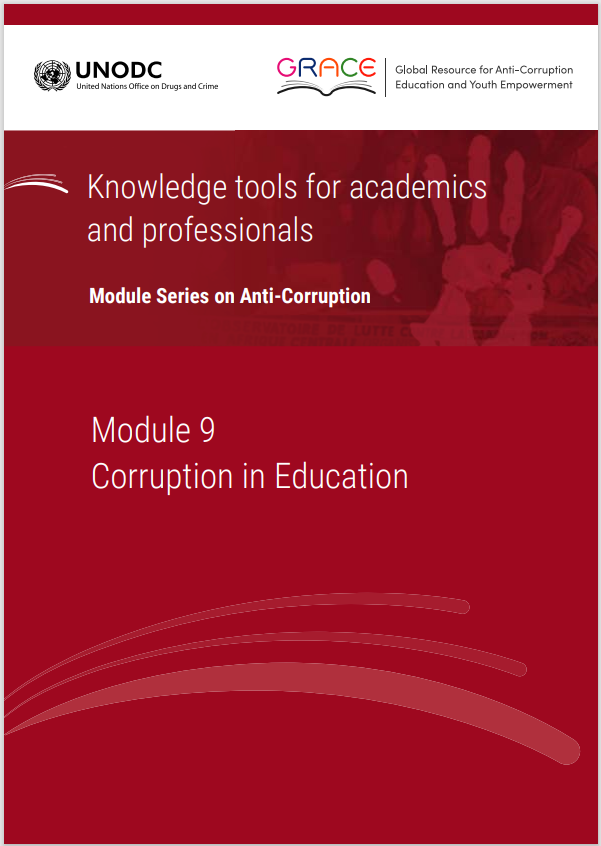This module is a resource for lecturers
Advanced reading
The following readings are recommended for students interested in exploring the topics of this Module in more detail, and for lecturers teaching the Module:
- Borcan, Oana, Mikael Lindahl and Andreea Mitrut (2014). The impact of an unexpected wage cut on corruption: Evidence from a "Xeroxed" exam. Journal of Public Economics, vol. 120 (December), p.p. 32-47.
- Borcan, Oana, Mikael Lindahl and Andreea Mitrut (2017). Fighting Corruption in Education: What Works and Who Benefits? American Economic Journal: Economic Policy, vol. 9, issue 1, pp. 180-209.
- Bretag, Tracey (2013). Short-cut students: From academic misconduct to academic integrity. In Global Corruption Report: Education . Berlin: Transparency International.
- Denisova-Schmidt, Elena, Martin Huber, and Yaroslav Prytula (2015). An experimental evaluation of an anti-corruption intervention among Ukrainian university students. Eurasian Geography and Economics, vol. 56, issue 6, p.p. 713-734.
- Deutsche Gesellschaft für Technische Zusammenarbeit (2004). Preventing Corruption in the Education System: A Practical Guide. Eschborn.
- Hallak, Jacques, and Muriel Poisson (2002). Ethics and corruption in education (Policy Forum No. 15). Results from the Expert Workshop held at the IIEP, Paris, France, 28-29 November 2001. Paris: IIEP-UNESCO.
- Heyneman, Stephen (2004). Education and Corruption. International Journal of Educational Development, vol. 24, issue 6 (November), p.p. 637-648. Elsevier.
- Heyneman, Stephen (2014). How Corruption Puts Higher Education at Risk. International Higher Education, no. 75 (Spring), p.p. 1-6.
- Heyneman, Stephen, Kathryn H. Anderson and Nazym Nuraliyeva (2008). The Cost of Corruption in Higher Education. Comparative Education Review, vol. 52, no. 1 (February), p.p. 1-25.
- Leach, Fiona (2013). Corruption as abuse of power: Sexual violence in educational institutions. In Global Corruption Report: Education. Berlin: Transparency International.
- Lucifora, Claudio and Marco Tonello (2014). Students' Cheating as a Social Interaction: Evidence from a Randomized Experiment in a National Evaluation Program. Journal of Economic Behavior and Organization, vol. 115.
- Organisation for Economic Co-operation and Development (OECD) (2015). Consequences of Corruption at the Sector Level and Implications for Economic Growth and Development. Paris.
- Osipian, Ararat L. (2012a). Economics of corruption in doctoral education: The dissertations market. Economics of Education Review, vol. 31, issue, 1 (February), p.p. 76-83.
- Osipian, Ararat L. (2012b). Will bribery and fraud converge? Comparative corruption in higher education in Russia and the USA. Compare (October), p.p. 252-273. Taylor and Francis.
- Poisson, Muriel (2010). Corruption and Education. Education Policy Series. Paris: International Academy of Education.
- Reinikka, Ritva and Jakob Svensson (2004). Local Capture: Evidence from a Central Government Transfer Program in Uganda. The Quarterly Journal of Economics, vol. 119, no. 2 (May), pp. 679-705.
- United Nations Development Programme (UNDP) (2015). Corruption-Risk Assessment in the Kosovo Education Sector.
- United Nations Educational, Scientific and Cultural Organization (UNESCO) (2016). Advisory statement for effective international practice: combatting corruption and enhancing integrity: a contemporary challenge for the quality and credibility of higher education.
Resources on fighting corruption through education
Another aspect of the education-corruption nexus is that education could be a powerful tool for preventing corruption. Although this topic is not discussed in Module 9, it is relevant to the broader discussion on how to fight corruption in a sustainable and effective manner, which is the cross-cutting theme of the E4J University Module Series on Anti-Corruption. Lecturers and students who are interested in this issue may wish to consult the following resources:
- Organisation for Economic Co-operation and Development (OECD) (2018). Education for Integrity: Teaching on Anti-Corruption, Values and the Rule of Law. Paris.
- Taylor, Veronica (2002). Anti-Corruption and Asian Legal Professions. In Corruption in Asia: Rethinking the Governance Paradigm, Tim Lindsay and Howard Dick, eds. Annandale, NSW: The Federation Press.
- United Nations, Conference of the States Parties to the United Nations Convention against Corruption. Education in schools and universities on anti-corruption efforts (article 13, paragraph 1 (c) of the United Nations Convention against Corruption). 28 May 2018. CAC/COSP/WG.4/2017/2/Rev.1
- Whalen-Bridge, Helena (2017). The Rhetoric of Corruption & The Law School Curriculum: Why Aren't Law Schools Teaching About Corruption? In Legal Education in Asia: From Imitation to Innovation, Andrew Harding and others, eds. Brill.
 Next: Student assessment
Next: Student assessment
 Back to top
Back to top
